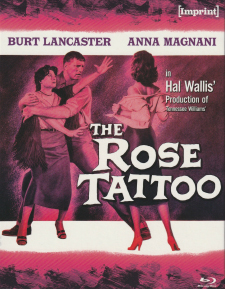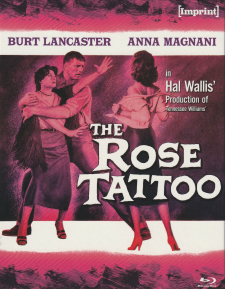Rose Tattoo, The (Blu-ray Review)

Director
Daniel MannRelease Date(s)
1955 (November 4, 2022)Studio(s)
Paramount Pictures (Imprint Films/Via Vision Entertainment)- Film/Program Grade: A
- Video Grade: A
- Audio Grade: A
- Extras Grade: B
Review
[Editor’s Note: This is a Region Free Blu-ray release.]
The 1950s saw many of Tennessee Williams’ plays adapted into films. The Glass Menagerie, A Streetcar Named Desire, Cat on a Hot Tin Roof, and Suddenly, Last Summer achieved critical acclaim and popular success at the box office, as did The Rose Tattoo, which combined the talents of a Hollywood movie star and an Italian actress in her first American film.
Serafina Della Rosa (Anna Magnani) is an immigrant seamstress from Sicily living on Florida’s Gulf Coast. She adores her handsome husband, Rosario, a truck driver who, unbeknownst to her, is also a small-time smuggler. When he dies in a police chase that ends in a fiery accident, she becomes reclusive, mourning his death for years and causing her young daughter, Rosa (Marisa Pavan), great distress. Now about to graduate from high school, Rosa meets and falls in love with sailor Jack Hunter (Ben Cooper). They want to marry, but Serafina is suspicious of Jack’s motives and tries to force Rosa to be as reclusive and repressed as she is.
Serafina learns that her trusted husband was unfaithful and his mistress had the rose tattoo on his chest copied onto her own. Rosa becomes consumed with ferocious grief at his betrayal and jealousy of her daughter’s new-found love turns into extreme possessiveness. However, when she meets another handsome truck driver at a church bazaar, the stifling barriers she has established for herself begin to fade. The man is Alvaro Mangiacavallo (Burt Lancaster), a high-spirited fellow who’s attracted to Serafina and rekindles a long-dormant flame within her.
Magnani’s performance is extraordinary. Her emotions—grief, anger, lust, and joy—are conveyed with such totality that they become entirely believable. With another actress, such a performance might be regarded as “actorly” or grandstanding, but Magnani makes them completely believable. What’s more, she’s absolutely riveting on screen, with her darting, suspicious eyes and body language conveying smoldering passion beneath a veneer of gentility and mourning. She can be equally effective with a fiery temper or consumed with grief as with enchantment by Alvaro’s clownishness. The entire first half of the film is devoted to Magnani’s Serafina. Lancaster doesn’t make his first appearance (with one brief exception) until 50 minutes into the film. And it’s worth the wait.
With a performance that holds its own against Magnani’s, Lancaster plays Alvaro as a carefree lover of life who manages to find joy in everything. His laugh is as big and impressive as his physique. He’s quite the opposite of Serafina, and his physicality and good looks soften her hard heart. There’s an easy camaraderie between them, making it seem as if they’ve known each other for years. It takes a while, but she can’t resist Alvaro. However, there are setbacks, disappointments, suspicions, and recriminations when the two personalities clash.
Pavan and Cooper, as the young lovers, offer contrast to Serafina and Alvaro. Idealistic, seeing only happiness ahead, they’re eager to start a life together. Though they lack the instant chemistry of Magnani and Lancaster, their characters are pleasant and represent a budding relationship free of psychological baggage.
Director Daniel Mann nicely opens up the stage play, even though a lot of the action takes place in Serafina’s home. There are scenes in a nightclub, at a tattoo parlor, and on the streets near Serafina’s house. The best parts of the film are the scenes between Magnani and Lancaster and their obviously comfortable rapport. They bristle with dialogue from Williams’ own screenplay, adapted by Hal Kanter. Lancaster is funny and almost boyish in his playfulness with Magnani, as his Alvaro woos and tries to charm Serafina. Lighter in tone than other Tennessee Williams works, The Rose Tattoo draws us in with its portrait of Serafina, brought to life in a terrific showcase performance by Anna Magnani.
The Rose Tattoo was shot by director of photography James Wong Howe on black-and-white 35 mm film in VistaVision, finished photochemically, and released in the aspect ratio of 1.85:1. The Blu-ray edition from Imprint Films features an aspect ratio of 1.78:1, sourced from a 4K scan by Paramount Pictures. Contrast and clarity are excellent. The picture is sharp, nearly pristine, with details well delineated, especially wallpaper patterns, women’s hair, Serafina’s flowered dress, and Rosa’s sheer dress. Blacks are deep and rich, and the grayscale is pleasing to the eye. Outdoor scenes are bright, almost sun-drenched, suggesting steamy Florida. Interiors are shadowy with little intense illumination. Serafina seems to struggle to see what she’s sewing. A rose that Alvaro gets tattooed on his chest is seen over the shoulder of the tattoo artist’s shoulder.
The soundtrack is English 2.0 Mono LPCM. English SDH subtitles are an available option. Dialogue is clear, though Magnani’s accent is sometimes hard to understand. Her speaking voice is highly emotional. The score by Alex North (A Streetcar Named Desire) can be sad and melancholy, as when Serafina learns of her husband’s death, or playful during scenes of Alvaro trying to impress Serafina. Sound effects include a speeding truck, police sirens, a crash, ambient crowd noise at a bazaar, and a player piano.
Bonus materials include the following:
- Audio Commentary with Alan K. Rode
- To Prepare for Discovery: An Anna Magnani Rhapsody (7:29)
- Theatrical Trailer (2:27)
In his informative commentary, film historian Alan K. Rode notes that Burt Lancaster was at the apex of his career. Producer Hal B. Wallis wanted Lancaster in The Rose Tattoo for box office insurance. Despite his greater star power, he was second-billed to Anna Magnani. Magnani had made an impression in the Italian film Open City, directed by Roberto Rossellini. She’s referred to as “the volcanic earth mother of Italian cinema.” Wallis assembled the best talent in front of and behind the camera for his big, prestige picture. Interiors were shot in Hollywood, exteriors in Key West, Florida. An Italian-speaking assistant was assigned to to Magnani to translate and see to the actress’s needs. Pier Angeli was the first choice for daughter Rosa, but she was under contract to MGM and the studio refused to lend her. Ben Cooper (“Jack”) had a “freshly scrubbed innocence” that was perfect for the role. It was difficult in the 1950s to make a film with adult themes. The Breen Office, the industry censorship overseer, tried to water down the stage play, but finally agreed to a form that would work on screen. Burt Lancaster’s goal from the beginning of his career was to produce his own pictures. He signed a seven-year contract with a stipulation allowing him to make one independent film each year. He was exhausted after starring in and directing The Kentuckian right before The Rose Tattoo. Director Daniel Mann re-shot scenes between Magnani and Lancaster after major filming had been completed. A career overview of playwright Tennessee Williams is provided. Elia Kazan, who had directed a number of Williams’ plays, suggested, after seeing a draft of The Rose Tattoo, that Williams flesh out the characters of Serafina and Alvaro. The Rose Tattoo was nominated for eight Academy Awards. It won three: Best Actress (for Anna Magnani), Best Art Direction (Tambi Larsen and Hal Pereira), and Best Cinematography (James Wong Howe). The film was a box office success, earning three times its cost.
To Prepare for Discovery: An Anna Magnani Rhapsody – Filmmaker Rob Nilsson discusses Anna Magnani’s craft as he watches The Rose Tattoo. Magnani can convey any emotion—jealousy, loyalty, religious fervor, despair, morality, passion. She’s a “woman for all countries” though she’s Mediterranean by birth. She sustains her character through various scenes in the film with her “contradictory sense of being.” She overflows in every emotion because she just can’t help it. Unfortunately, unnecessary distracting music plays in the background.
Instead of Williams’ trademark decadence, the South in The Rose Tattoo focuses on the Italian immigrant experience. Anna Magnani’s performance adds credibility to Sicilian views of family, gender roles, and honor. Burt Lancaster overacts as Alvaro, but it’s appropriate for the role. His character brightens Serafina’s bleak, years-long despair and allows her to see that life offers more for her than loneliness and bitterness.
- Dennis Seuling

